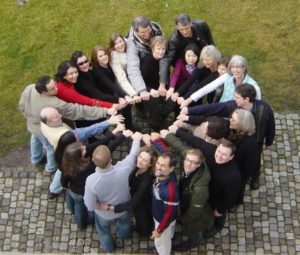
By Kim Arndt
It was the summer of 2007 when I attended my first training meeting in Küsnacht. The facilitator, a seasoned analyst, said that during our training we would make friends we would have for the rest of our lives. I looked around the room, wondering how this prediction might be realized. We were all new students, and many were so credentialed and educated, I felt intimidated.
We began the International English Block program, a new structure that was nevertheless grounded in the training that had taken place for decades. I did not know that the structure was new, but I quickly felt the excitement of a new beginning. It took awhile to realize that the success of the program would depend on the graduates it produced, me among them.
The lectures and seminars were evocative and challenging, and also included self experience work that assisted with integrating the material and processing with peers. The Association Experiment was arduous, and I learned so much from it! I am grateful to have had access to many excellent supervisors who have different strengths and perspectives from which to draw.
We made intense connections during the semesters, and we met the challenge of sustaining the connections and intensely pursuing our studies between semesters. We read volumes of the Collected Works, and then discussed online, using a forum on the student website. It was a thrilling way to process the material—to be in touch when we were so physically distant. My study groups would routinely include people on 4 continents, greatly enriching the discussions because of the diverse cultural perspectives. Then Skype made staying in touch exponentially easier! It was like we were asking the question: “What does it mean to be a human being?” The International program was a way to sort through this question. On one hand, I would discover with delight that someone from Asia had the same essential concerns about life as me. On the other hand, we would compare our very different interpretations of world events, fairy tales and other phenomena and realize that our cultures and individual experiences shaped us profoundly as human beings different from one another.
My cohorts introduced me to many experiences I would not otherwise have had. I attended a Milonga (event where the tango is danced) several times with fellow students. The dancers’ bodies pressed close, in a unique and perfect rhythm of longing that must stay unfulfilled, and created a palpable atmosphere that was painful and beautiful and sensual. Other experiences include being hosted by fellow students in Moscow, and Munich, and participating in the ordination of a student-friend at St. Otillien Monastery in Germany.
It was a time of joy and support among our group. The major motif was participation! We wanted one another to succeed, and we celebrated each success. We also consoled one another in our setbacks, which were inevitable. The genuine caring and enthusiasm for the whole endeavor was vital and sustaining. That is why I want to continue this vital exchange of energy through the newly formed Alumni Association.







